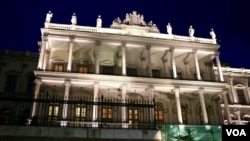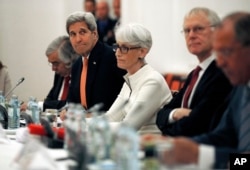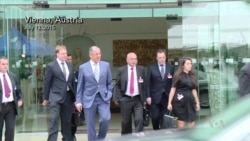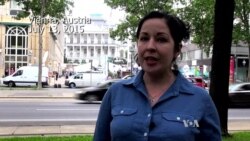Marathon talks between Iran and world powers in Vienna on a historic nuclear agreement continued into early Tuesday, with growing signs that a final deal is imminent.
Negotiators from Iran and the P5+1 countries have been scrambling to finalize the details of the agreement after deadline on the latest round of talks expired Monday.
Catherine Ray, a European Union spokesperson, said all of the parties would hold a final session of talks Tuesday morning, followed by a news conference.
On Monday, the American diplomatic delegation in the Austrian capital divulged little information throughout the day, but back in Washington Monday, White House spokesman Josh Earnest said “genuine progress” had been made, although several issues remained under review. He added that negotiators would remain at the table as long as the discussions between Iran and the six other countries were productive.
“If the talks are not completed today, then the interim agreement will be extended again,” Earnest added.
By late Monday, a State Department spokesman told VOA negotiators were “close” to a deal, although “sticking points” remained. U.S. Secretary of State John Kerry continued meetings with his counterparts well into the night at Palais Coburg, headquarters for this latest round of talks.
Monday’s missed deadline — the fourth since negotiations began in Vienna in late June — came with little surprise. Efforts to finalize an agreement more than a decade under construction that would curb Iran’s nuclear program in exchange for the removal of economic sanctions on the country faced repeated challenges regarding oversight over Iran’s nuclear program, and the extent of sanctions relief.
WATCH: Russian FM Sergei Lavrov is asked if there's a chance of a deal today
Closed door talks
Earlier Monday, acting spokesman for the Iranian foreign ministry during the talks, Alireza Miryousefi, cast doubt on a final deal being announced by the end of the day.
"Everyone working hard to get to yes today, but political will still required," Miryousefi said on Twitter.
Top diplomats from the US, its EU partners, Russia, and China continued closed-door meetings Monday at the Palais Coburg, where the talks are being held.
Throughout the day, diplomats had hinted the group, known as the P5+1, and Iran were close to having the complex document ready.
China's Foreign Minister Wang Yi said conditions were in place for a "good agreement."
"We believe that there cannot and should not be further delays in the negotiations," Wang said.
WATCH: Heather Murdock reports from Vienna
Step forward, step back
With evening falling in Vienna on Monday, Iranian President Hassan Rouhani summarized the day with two tweets, briefly prompting a buzz near the Palais Coburg that a deal was imminent.
First he invoked the upbeat tone shared by some senior officials in recent days, seemingly confirming that an agreement was in hand after grinding, round-the-clock diplomatic talks for more than two weeks.
The post was swiftly deleted, only to be replaced by a second tweet that cautiously added an "if," walking back Rouhani’s original exuberance.
Protesting tourists
Outside the Palais Coburg, a group of about 20 American tourists staged a brief, but loud protest Monday afternoon — one of the only demonstrations in Vienna since the start of talks.
Amid shouts of "No deal! No deal," protester Mark Kaplan said the group came out to encourage Kerry to ax negotiations. He said he believes any allowances for Iran's nuclear program will lead to an atomic weapon, jeopardizing Israel and the rest of the region.
"We just want everybody to know we don't think it's a good deal," Kaplan told VOA. "What would I tell Kerry? I would tell Kerry don't do a deal with [Iran]. There's no way to allow them to continue — they have never proved that they can keep their word."
But Kaplan is in the minority. American voters largely back a nuclear deal with Iran, 58 percent to 33 percent, according to a Quinnipiac poll at the end of April.
Republican Senator James Lankford told VOA, "I have always been concerned there would be endless extensions just because we are dealing with Iran. That's the big challenge here a partner that has been unreliable since 1979.
"To make a deal with Iran is a very difficult thing to do, because they do not keep their end of the bargain. So now we have to make sure that everything [in a deal] is verifiable. If it's not verifiable, we shouldn't do it, and I think that is where Iran is balking," he said.
WATCH: Protesters express displeasure at prospect of Iran nuclear deal
Long road to resolution
The process to address allegations that Iran was working to develop nuclear weapons — charges it denies — has included several smaller agreements along the way, starting with an interim deal in November 2013 that curbed the country's nuclear activity in return for limited sanctions relief.
The two sides agreed to work on a permanent deal with limits and monitoring on Iran's nuclear program in exchange for comprehensive lifting of sanctions imposed by the United Nations and by individual countries.
That was supposed to take six months, but the process has dragged on because of debates that included the pace of lifting the sanctions, access inspectors would have to Iranian facilities, and most recently Iran's push to have an arms embargo lifted.
VOA White House Correspondent Aru Pande and Heather Murdock and Brian Allen contributed to this report from Vienna.









